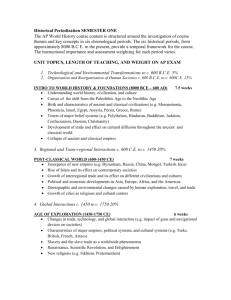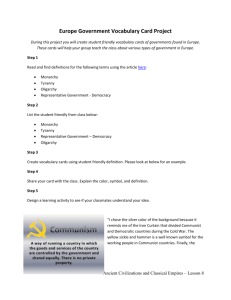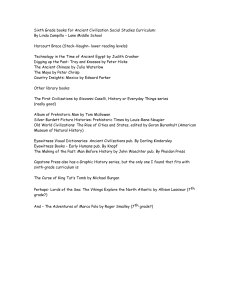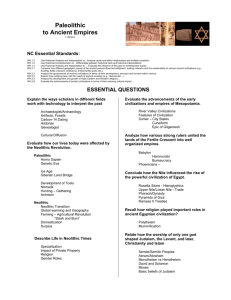9th Grade Global History Lesson Calendar - Global History 1
advertisement
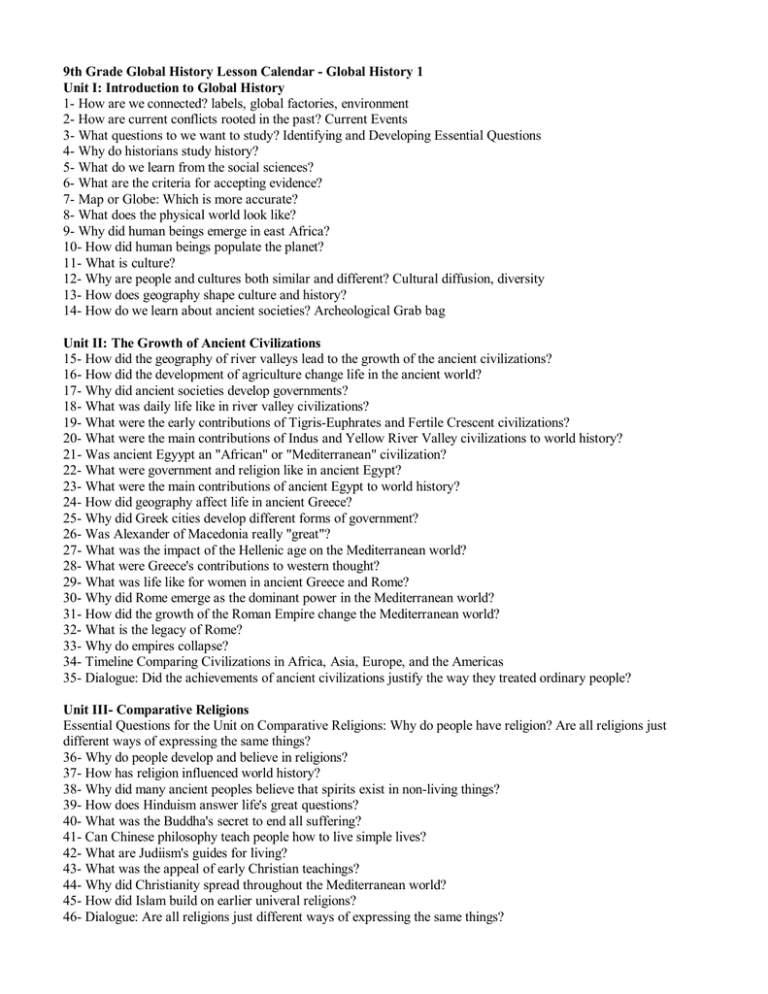
9th Grade Global History Lesson Calendar - Global History 1 Unit I: Introduction to Global History 1- How are we connected? labels, global factories, environment 2- How are current conflicts rooted in the past? Current Events 3- What questions to we want to study? Identifying and Developing Essential Questions 4- Why do historians study history? 5- What do we learn from the social sciences? 6- What are the criteria for accepting evidence? 7- Map or Globe: Which is more accurate? 8- What does the physical world look like? 9- Why did human beings emerge in east Africa? 10- How did human beings populate the planet? 11- What is culture? 12- Why are people and cultures both similar and different? Cultural diffusion, diversity 13- How does geography shape culture and history? 14- How do we learn about ancient societies? Archeological Grab bag Unit II: The Growth of Ancient Civilizations 15- How did the geography of river valleys lead to the growth of the ancient civilizations? 16- How did the development of agriculture change life in the ancient world? 17- Why did ancient societies develop governments? 18- What was daily life like in river valley civilizations? 19- What were the early contributions of Tigris-Euphrates and Fertile Crescent civilizations? 20- What were the main contributions of Indus and Yellow River Valley civilizations to world history? 21- Was ancient Egyypt an "African" or "Mediterranean" civilization? 22- What were government and religion like in ancient Egypt? 23- What were the main contributions of ancient Egypt to world history? 24- How did geography affect life in ancient Greece? 25- Why did Greek cities develop different forms of government? 26- Was Alexander of Macedonia really "great"? 27- What was the impact of the Hellenic age on the Mediterranean world? 28- What were Greece's contributions to western thought? 29- What was life like for women in ancient Greece and Rome? 30- Why did Rome emerge as the dominant power in the Mediterranean world? 31- How did the growth of the Roman Empire change the Mediterranean world? 32- What is the legacy of Rome? 33- Why do empires collapse? 34- Timeline Comparing Civilizations in Africa, Asia, Europe, and the Americas 35- Dialogue: Did the achievements of ancient civilizations justify the way they treated ordinary people? Unit III- Comparative Religions Essential Questions for the Unit on Comparative Religions: Why do people have religion? Are all religions just different ways of expressing the same things? 36- Why do people develop and believe in religions? 37- How has religion influenced world history? 38- Why did many ancient peoples believe that spirits exist in non-living things? 39- How does Hinduism answer life's great questions? 40- What was the Buddha's secret to end all suffering? 41- Can Chinese philosophy teach people how to live simple lives? 42- What are Judiism's guides for living? 43- What was the appeal of early Christian teachings? 44- Why did Christianity spread throughout the Mediterranean world? 45- How did Islam build on earlier univeral religions? 46- Dialogue: Are all religions just different ways of expressing the same things? Unit IV: Expanding Zones of Exchange and Encounter (500-1200) Essential Question: Why does change appear to emerge from the periphery? Compare the rise of Rome in a region dominated by the Eastern Mediterranean; the emergence of Europe following dominance by Central and East Asia; the US and Soviet Union emerging as world powers following wars between England, Germany and France. Is history determined or are events contingent? 47- Why was central Asia the birthplace of armies and empires? 48- What happens when waves of new peoples invade an empire? (India, China and Rome) 49- What was life like in the Byzantine Empire of the eastern Mediterranean? 50- How does Byzantine art help us understand Byzantine society? 51- Life on the Periphery: Why did feudalism develop in western Europe and Japan? 52- What was the "feudal arranagement" in western Europe? 53- What was like life for ordinary people in feudal Europe? 54- Why did Europeans build Cathedrals (Why does God need such a big house)? 55- How does medieval art help us understanding European society? 56- What was life like in feudal Japan? 57- What is the code of the Bushido? 58- How did feudalism differ in Japan and France? 59- How did Islam develop in the Arabian Peninsula? 60- How did Islam spread to Africa and in Asia? 61- What were Islams contributions to world culture? 62- The Crusades: What happens when world's collide? 63- How did economic growth transform feudal Europe? (towns, trade, plague) 64- What forces led to the end of fedual society in Europe? (Empires, Crusades, internal religious conflict) Project ideas: Comparative Religion project; Travel Brochure; Global Art. Mapping the Ancient World; Current Events Folder 9th Grade Global History Lesson Calendar - Global 2 Unit V: Global Interactions 1- How did the Gupta empire shape Indian society? 2- Why did central Asian armies dominate the region and threaten Europe? 3- Why was the Tang Empire of China a model for other Asian people? 4- Could the Mongols reshape China? 5- What happened when Chinese and European societies met? 6- Why did the Emperor of China have his fleet turn back? 7- What was life like in west African? 8- What were the major achievements of west Africans civilizations? 9- What happened when Islam and West Africa met? 10- Dialogue: If you had to make a $20 bet in 1450 on which region of the world would emerge as dominant over the next 500 years, where would you have placed your money? Why? Unit VI: The Emergence of Western Europe as a World Power 11- Why did a revival of trade lead to broad social change in Western Europe? 12- How did internal strife lead to reorganization in Europe? 13- Why did commerce flourish? 14- What was the Renaissance? 15- How is the art of Raphael a window into the Italian Renaissance's way of seeing the world? 16- Which is the real Madonna? 17- What is the Japanese Aesthetic? 18- Why do Japan and Europe take different paths? 19- How did technology change the European world? 20- Why did Europe turn outward? 21- How did the voyage of Columbus transform the world? 22- Why did European countries explore the Americas? 23- Was the Age of Exploration a cause or a result of the split in Western Christianty? 24- What did Martin Luther and John Calvin teach? 25- Why did the Protestant Reformation win support? 26- How did the Catholic Church respond? 27- How did the religious wars in Europe end? 28- How did Islam reshape India? 29- What was life in India during the Mogul empire? 30- How did the Ottomans and Safvid empires integrate southwest Asia? 31- How did Japan emerge as a nation? 32- What is the philosophy of Zen? 33- How did literature contribute to nation building in Europe? 34- Dialogue: How did a divided region on the periphery of great empires become the dominant force that reshaped the world? Unit VII: The Age of Exploration and the Slave Trade Reshape the World 35- How did geographical conditions help and hinder the growth of American societies? 36- What were the achievements of the Mayan? 37- What were the achievements of the Aztec and Incan Empires? 38- How did Western Europe conquer the Americas? 39- What was the impact of the Columbian Encounter on the indigenous people of America? 40- Why did the Columbian Encounter lead to war in Europe? 41- How did the Columbian Encounter change life in Europe? 42- How did the Columbian encounter lead to the trans-Atlantic Slave Trade? 43- What was the impact of the Slave Trade on life in West Africa? 44- How did the Atlantic Slave trade reshape the world? 45- Why did European nations build colonial empires? 46- How did European nations govern world empires? 47- How did Africans resist slavery? 48- Why did Asia open to the west? 49 - How did commerce and industrialization change Europe society? 50- How did technology change the way goods were produced? 51- Dialogue: How did the resources of the America and the labor of Africa contribute to the industrial revolution? Unit VIII: Enlightenment Ideas and Government Essential Questions: What is the basis of knowledge? Do laws of nature govern human and social behavior? 52- What were the origins and ideals of the European Enlightenment? 53- Why did a scientific revolution change the way European philosophers understood the world? 54- Why did the British battle against Absolutism? 55- How did British philosophers apply Enlightenment ideas to human relations? 56- Why did Voltaire argue for a "Spirit of the Laws"? 57- Why do people live in societies? 58- How did Enlightenment ideas affect the people of Europe? 59- How did Enlightenment ideas lead to an Age of Revolution? 60- Dialogue: Do the spread of Christianity, Industrialization, the Enlightenment, the Scientific Revolution, and other European achievements following the Columbian Encounter justify the horrors of conquest, slavery, and colonization? Project Ideas: Global History Woman's Rights Convention; Women in History; Newspaper Project; Mapping the World; European Renaissance Science Fair; Current Events Folder



